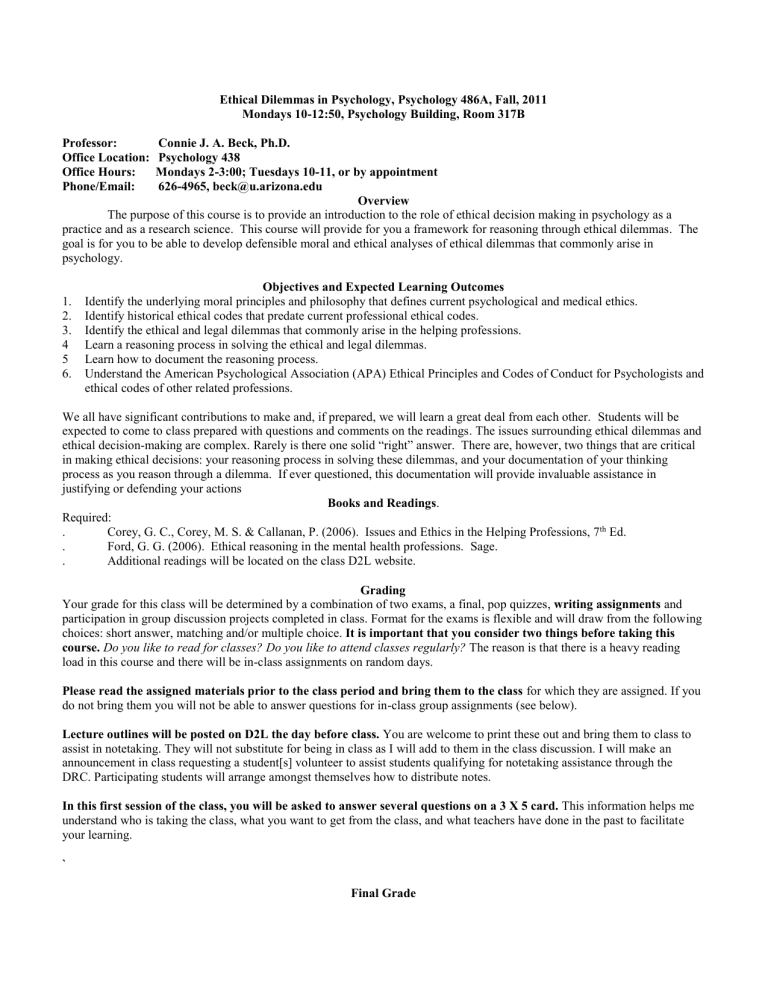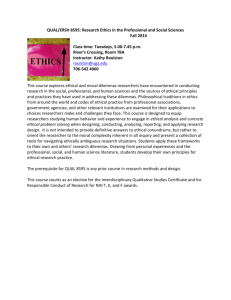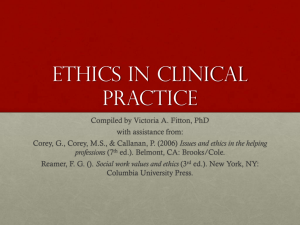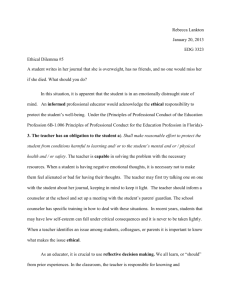Psy 486A - Department of Psychology

Ethical Dilemmas in Psychology, Psychology 486A, Fall, 2011
Mondays 10-12:50, Psychology Building, Room 317B
Professor: Connie J. A. Beck, Ph.D.
Office Location: Psychology 438
Office Hours: Mondays 2-3:00; Tuesdays 10-11, or by appointment
Phone/Email: 626-4965, beck@u.arizona.edu
Overview
The purpose of this course is to provide an introduction to the role of ethical decision making in psychology as a practice and as a research science. This course will provide for you a framework for reasoning through ethical dilemmas. The goal is for you to be able to develop defensible moral and ethical analyses of ethical dilemmas that commonly arise in psychology.
Objectives and Expected Learning Outcomes
1. Identify the underlying moral principles and philosophy that defines current psychological and medical ethics.
2. Identify historical ethical codes that predate current professional ethical codes.
3. Identify the ethical and legal dilemmas that commonly arise in the helping professions.
4 Learn a reasoning process in solving the ethical and legal dilemmas.
5 Learn how to document the reasoning process.
6. Understand the American Psychological Association (APA) Ethical Principles and Codes of Conduct for Psychologists and ethical codes of other related professions.
We all have significant contributions to make and, if prepared, we will learn a great deal from each other. Students will be expected to come to class prepared with questions and comments on the readings. The issues surrounding ethical dilemmas and ethical decision-making are complex. Rarely is there one solid “right” answer. There are, however, two things that are critical in making ethical decisions: your reasoning process in solving these dilemmas, and your documentation of your thinking process as you reason through a dilemma. If ever questioned, this documentation will provide invaluable assistance in justifying or defending your actions
Books and Readings .
Required:
. Corey, G. C., Corey, M. S. & Callanan, P. (2006). Issues and Ethics in the Helping Professions, 7 th Ed.
. Ford, G. G. (2006). Ethical reasoning in the mental health professions. Sage.
. Additional readings will be located on the class D2L website.
Grading
Your grade for this class will be determined by a combination of two exams, a final, pop quizzes, writing assignments and
` participation in group discussion projects completed in class. Format for the exams is flexible and will draw from the following choices: short answer, matching and/or multiple choice. It is important that you consider two things before taking this course.
Do you like to read for classes?
Do you like to attend classes regularly?
The reason is that there is a heavy reading load in this course and there will be in-class assignments on random days.
Please read the assigned materials prior to the class period and bring them to the class for which they are assigned. If you do not bring them you will not be able to answer questions for in-class group assignments (see below).
Lecture outlines will be posted on D2L the day before class.
You are welcome to print these out and bring them to class to assist in notetaking. They will not substitute for being in class as I will add to them in the class discussion. I will make an announcement in class requesting a student[s] volunteer to assist students qualifying for notetaking assistance through the
DRC. Participating students will arrange amongst themselves how to distribute notes.
In this first session of the class, you will be asked to answer several questions on a 3 X 5 card.
This information helps me understand who is taking the class, what you want to get from the class, and what teachers have done in the past to facilitate your learning.
Final Grade
60 points
60 points
100 points
30 points
1 st Exam
2 nd Exam
Cumulative Final Exam
In-class group projects, quizzes and writing assignments (approximately 10)
250 Points Total 90% and above =A, 80-89%=B, 70-79=C, 60-69=D, Below 60%= F
Missed Classes and Make-Up Quizzes or Exams
It is important that you attend class every day. If you cannot attend class, arrange to obtain class notes from another student who did attend or come to my office hours. All holidays or special events observed by organized religions will be honored for those students who show affiliation with that particular religion. Absences pre-approved by the UA Dean of Students (or
Dean’s designee) will be honored. If you miss a class on the day of a random in-class assignment or quiz AND you let me know in advance of your anticipated absence, I will have an alternative assignment to be completed and turned in by the next class meeting. Please note, however, that I will only give you an alternative assignment for a limited number of absences
(two). If you miss more than two in-class assignments, you will obtain a zero for those additional assignments.
In the EXTREMELY unlikely event you miss an exam, an alternative Exam will be given ONLY IF prior arrangements have been made with the instructor or with a university-approved excuse and appropriate documentation. If you must take a makeup exam, it will be all essay questions or an oral exam.
Class Policies
1. There will be no laptops allowed in the classroom. Unfortunately in past classes there have been students who spent most of their class time on social networking websites, shopping, watching movies or YouTube. Student feedback to me indicated that it was very distracting for those who were trying to listen. It was also very distracting for me in trying to lecture. In dealing with the disruption I may miss teaching important concepts.
2. Please come to class on time. Arriving late is disruptive and distracting, and you may miss out on in-class assignments.
3. Some students pass notes, whisper or talk to those sitting near them during lectures. These behaviors are distracting for those students who are paying attention. If you do so you will be asked to either share what you are discussing the class or leave the room.
4. Please turn off all cell phones before entering the classroom. Again, student feedback to me indicated that students texting and/or talking on the phone during class was very distracting for those who were trying to listen and learn. Please turn off your cell phones as you come into class. If you text or talk on the phone during class times or during in-class assignments, you will be asked to pack up your belongings and leave the class. If it happens repeatedly I will administratively drop you from the course.
5. If you have any difficulty with the material, questions or comments about the class, please do not hesitate to come to my office hours or make an appointment to meet with me. I set time aside each week to be available to you. Please use this time for your benefit. If you are considering asking for a letter of recommendation, it is very difficult to write a letter if I do not know anything about you other than your scores on an exam. A good method of me learning more about you and your interests is to attend office hours.
6. If you are caught cheating, you will receive a failing grade for the course and I will report you to the Dean of Students.
The University has a policy on plagiarism and it is found at: http://studpubs.web.arizona.edu/policies/cacaint.htm
.
Threatening behavior is also not tolerated and the University policies concerning threatening behavior by students found at: http://policy.web.arizona.edu/~policy/threaten.shtml
.
7. The schedule of topics and readings is approximate. We have several guest speakers scheduled and I may need to make changes to accommodate schedules. I may also make changes to accommodate new materials. In either case I will let you know as we proceed through the semester. You are responsible for any changes made to the syllabus.
8. If you anticipate barriers related to the format or requirements of this course, please meet with me so that we can discuss ways to ensure your full participation in the course. If you determine that disability-related accommodations are necessary, please register with Disability Resources (621-3268; drc.arizona.edu) and notify me of your eligibility for reasonable accommodations. We can then plan how best to coordinate your accommodations.
Date
Week 1:
August 22
Week 2:
August 29
Week 3:
September 5
Week 4:
September 12
Week 5:
September 19
Week 8:
October 10
Week 9:
October 17
Week 10:
October 24
Week 11:
October 31
Week 12:
November 7
Class Schedule and Readings
Topic
Intro to class and materials.
What is the big deal? What issues come up in psychological practice and research?
History of Ethics
NO CLASS
Moral Principles
Moral Philosophy & Ethics
EXAM 1
Assigned Readings
1. Shuster, E. (1997). Fifty years later: The significance of the
Nuremberg Code. The New England Journal of Medicine,
337 , (20), 1436-1440.
2. World Medical Association (1964). Declaration of Helsinki:
Ethical principles for medical research involving human subjects.
1. Department of Health, Education, and Welfare (1979). The
Belmont Report: Ethical principles and guidelines for the protection of human subjects of research. National Institutes of Health website ( www.nih.gov
)
2. Rothman, D.J. (1982). Were Tuskegee and Willowbrook
‘studies in nature?’
The Hastings Center Report, 12(2) , 5-7.
3. Chapter 1 (Ford book)
LABOR DAY
1. Chapter 1 (Corey, Corey, & Callanan).
2. Chapter 2 (Ford book)
1.
Chapter 4 (Ford book).
2. Movie Miss Ever’s Boys
3. Shweder, R. A. (2004). Tuskeegee re-examined. Spiked
Online.
Week 6:
September 26
Week 7:
October 3
Ethical Reasoning, Ethical
Standards and Codes
Therapist Role & Values;
Diversity & Vulnerable
Populations
Ethical Dilemmas in
Psychotherapy & Counseling
1. Chapter 5 (Ford book).
2. APA (2002). Ethical Principles of Psychologists & Code of
Conduct. American Psychologist, 57 (12), 1060-1073.
3. Steps to Conducting an Ethical Analysis
4. Arizona Board of Psychology Examiners Statutes
1. Chapters 3 & 4 (Corey, Corey, & Callanan)
Confidentiality, Privacy, &
Privilege
Competence & Training;
Supervision & Consultation
EXAM 2
1. Chapters 5 & 7 (Corey, Corey, & Callanan).
2. Chapter 9 (Ford book).
1. Chapter 6 (Corey, Corey, & Callanan).
1. Chapters 8 & 9 (Corey, Corey, & Callanan).
2. Baker Shoham McFall article
Week 13:
November 14
Week 14:
November 21
Week 15:
November 28
Week 16:
December 5
December 14
Psychotherapy and Forensic
Practice Issues
Psychotherapy with Couples and Groups
Community Work
Research Ethics
FINAL EXAM
1. Chapter 10 (Corey, Corey, & Callanan).
2. Committee on ethical guidelines for forensic psychologists
(2011, in press). Specialty guidelines for forensic psychologists. American Psychologist .
3. Killer Instincts article.
4. Chapter 13 (Ford Book).
1. Chapters 11 & 12 (Corey, Corey, & Callanan).
1. Chapter 13 (Corey, Corey, & Callanan)
2. Chapter 7 (Ford book).
1.
Chapter 12 (Ford book).
2.
Coan, J. (1997) Lost in a shopping mall: An experience with controversial research. Ethics & Behavior , 7(3), 271-
284.
3.
Milgram, S. (1963) Behavioral study of obedience.
NOTE DATE, TIME and possible location change
10:30-12:30 location tba





